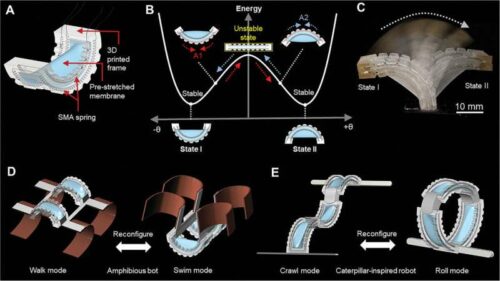Researchers have developed shapeshifting soft robots that can walk, roll, crawl and even swim on both land and sea with ease.

Thanks to Tiktaalik-”the fish that walked out of water”, researchers were able to develop a robot that can easily shift from land to sea. We have seen robots that could walk any rough terrain with ease. However shifting from walking to swimming, just like most of the animals, could be considered a very beneficent ability for robot applications as well.
Researchers at Carnegie Mellon University have created soft robots that can seamlessly shift from walking to swimming, for example, or crawling to rolling. To enable such transition in mere machines researchers adapted a bistable actuator which is made of 3D-printed soft rubber containing shape-memory alloy springs that react to electrical currents by contracting, which causes it to bend. The team used this bistable motion to change the actuator or robot’s shape. Once the robot changes shape, it is stable until another electrical charge morphs it back to its previous configuration.
Being inspired from nature, on the other hand, can be a challenge as well. “Matching how animals transition from walking to swimming to crawling to jumping is a grand challenge for bio-inspired and soft robotics,” said Carmel Majidi, a professor in the Mechanical Engineering Department in CMU’s College of Engineering. For example, one robot the team created has four curved actuators attached to the corners of a cell phone-sized body made of two bistable actuators. On land, the curved actuators act as legs, allowing the robot to walk. In the water, the bistable actuators change the robot’s shape, putting the curved actuators in an ideal position to act as propellers so it can swim.
The team created two other robots: one that can crawl and jump, and one inspired by caterpillars and pill bugs that can crawl and roll. The actuators require only a hundred millisecond of electrical charge to change their shape, and they are durable. The team had a person ride a bicycle over one of the actuators a few times and changed their robots’ shapes hundreds of times to demonstrate durability.
These robots, in near future, could be used in rescue situations or to interact with sea animals or coral. Using heat-activated springs in the actuators could open up applications in environmental monitoring, haptics, and reconfigurable electronics and communication.
Reference : Dinesh K. Patel et al, Highly Dynamic Bistable Soft Actuator for Reconfigurable Multimodal Soft Robots, Advanced Materials Technologies (2022). DOI: 10.1002/admt.202201259






